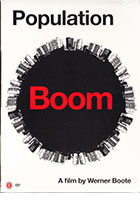
Population Boom 2013
Distributed by First Run Features, 630 Ninth Avenue, Suite 1213, New York, NY 10036; 212-243-0600
Produced by NGF Geyrhalter Film
Directed by Werner Boote
DVD, color, 90 min.
High School - General Adult
Economics
Date Entered: 03/10/2016
Reviewed by Michael J. Coffta, Business Librarian, Bloomsburg University of PennsylvaniaA follow-up to director Werner Boote’s Plastic Planet, this work examines the continuing growth in human population. After brief looks at business practices and media treatment of the overpopulation issue, the film primarily centers upon national and international policies affecting population control. The film takes intriguing looks at the world’s reactions to historical population growth landmarks, such as 6 billion in 1999, and the respective forecasts preceding these landmarks. The film also briefly examines a handful of economic and philosophical concepts, including Malthusian theory.
The true strength of this skeptical work is its scrutiny of past and present policies of the US, other nations, and the UN, both public and secret. While Mexico, for example, has successfully lowered its birth rate, China’s one-child policy has had unexpected consequences. Although the Chinese government has curbed the birth rate, the decrease in population led to growth in personal income and therefore consumption. Additionally, there has been shrinking demand for schools and other youth-related services in China, due to the reduced-sized demographic.
Boote interviews a host of high ranking government officials around the global to pose often brusque but relevant questions on policies and their effectiveness. Too, he interviews people from everyday walks of life including a Chinese woman about to be married, and a group of visitors at a mysterious Georgia monument to overpopulation. To the last point, Boote partakes in a number of cultural activities including festivals and daily commutes in congested urban areas around the world. Overall, Boote questions the threat of overpopulation, citing industrialized nations’ environmental abuses and food production practices.
This work rewards the audience with amazing editing, watching as the director Boote seemingly steps out of an office in Beijing into a slum in India. Globetrotting, barely begins to say it. Boote does a superb job of creating himself as a character, creating an atmosphere and somewhat light tone to the film, all while adopting the quirky habit of standing in traffic.
Not overflowing with data, this work is highly recommended for those who want to witness an inside-out analysis of the global overpopulation issue. It should not be overlooked that this work stands as a brilliant cultural study.